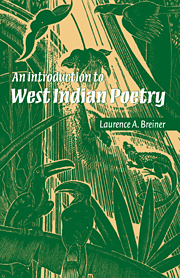Book contents
- Frontmatter
- Contents
- Preface
- Chronology for Anglophone Caribbean poetry
- Map of the Caribbean
- 1 West Indian poetry and its audience
- 2 The Caribbean neighborhood
- 3 Overview of West Indian literary histories
- 4 The relation to “Europe”
- 5 The relation to “Africa”
- 6 The relation to “America”
- Notes
- Guide to further reading
- Index
6 - The relation to “America”
Published online by Cambridge University Press: 06 January 2010
- Frontmatter
- Contents
- Preface
- Chronology for Anglophone Caribbean poetry
- Map of the Caribbean
- 1 West Indian poetry and its audience
- 2 The Caribbean neighborhood
- 3 Overview of West Indian literary histories
- 4 The relation to “Europe”
- 5 The relation to “Africa”
- 6 The relation to “America”
- Notes
- Guide to further reading
- Index
Summary
Chapter 4 examined poetry associated with a nationalist agenda which is anti-colonial and committed to establishing difference from “Europe.” Such an agenda is inherent in the situation of West Indian territories early in the twentieth century. Chapter 5 considered poetry associated with the West Indian embrace of “Africa.” This opportunity does not derive from any logic or dynamics inherent in the nationalist project or even the West Indian situation; rather, external conditions dropped “Africa” (that amorphous complex of information, attitudes, and values) into the lap of West Indian intellectuals. The paths of these two developments often crossed, and sometimes merged. The efforts to move further from one parent-tradition and closer to another were not necessarily coordinated, but they often overlapped, for example with respect to the high valuation of the peasantry and of folk culture – a feature of nationalism strongly reinforced by the prominence of language and folkways in the perception of “Africa.” So “Europe” provides the occasion for the process of negative definition, via opposition, rejection, and critique. “Africa” makes possible a dialectical definition. The elaborate assertion that the West Indies is less European and more African comprises the main thrust of West Indian thinking in the middle of this century. The renegotiation of relations with metropolitan culture only occasionally took the extreme form of rejection, just as the rediscovery of cultural contact with Africa only occasionally took the extreme form of unconditional identification with Africa. Instead both maneuvers contributed mightily toward the common aim of establishing a space for distinctly West Indian writing.
Even so, West Indian poets sometimes expressed discomfort with this indirect way of establishing a space for themselves.
- Type
- Chapter
- Information
- An Introduction to West Indian Poetry , pp. 195 - 231Publisher: Cambridge University PressPrint publication year: 1998



